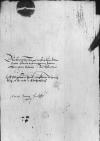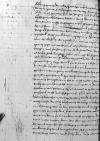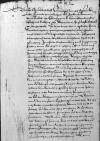E(uer) L(ieb) ⌊⌋, / darinnenn unns dieselb, / des edlenn unnd ernvestenn unnsers besondernn liebenn, / des ⌊woÿwodenn zw Ploczke⌋ ⌊schwester⌋ ⌊son⌋ gewerbe. / So er an unns vonn gedochts hernn ⌊woiwoden⌋ wegenn zutragenn genediglich anczuhorenn unnd widerumb mit genediger anntwurt / zubegegnen bittenn unnd unns denselbenn bevhelenn thuet enntpfanngenn, / innhalts vorstanndenn unnd eingenomen habenn unns derwegenn / gegenn ihme sovil ann unns / aller genedigenn gepur ertzeigeth / unnd ihnenn nach unnser gelegenheit auff sein anntragen beantwurtett / unnd abgefertigeth. / Vorsehennlich der herr ⌊woÿwod⌋ auch seiner h(errlichkei)t geschikter damit zufridenn sein unnd unns darumb nicht vordennkenn werdenn.
Nachdem E(uer) L(ieb) auch sich uber unnsernn ⌊hauptman zw ⌊Ortelspurg⌋⌋, das er dis gegenn E(uer) L(ieb) underthanenn vortzuvemenn dreweth / das vor mehr kein amptman gethann beschwerehn thuet. Wollenn wir E(uer) L(ieb) darauff nicht pergenn, das wir des hanndels halbenn, / sunderlichenn grossenn bericht nicht habenn vorstehenn aber doch vonn unnserm ⌊hauptmann⌋ das E(uer) L(ieb) unnderthanenn inn unnserer wiltnus unnd inn ⌊unnserm furstennthum⌋ weit uber die grenitz beuttenn machenn sollenn, / darann noch nicht ersettigeth sunder auch denn unnsernn, do sie der ort betrettenn / beuttenn zumachenn sich unnderstehen zuneherenn. / Wo nhun solchs seinem bericht nach also hettenn E(uer) L(ieb) zuermessenn, mit was pillikeit solches vann E(uer) L(ieb) unnderthanenn vorgenhomenn habenn dernwegenn dem amptmann uff solches gut acht zugebenn unnd uber dem unnserm zuhaltenn sovil zimlich unnd pillich bevholenn. / So dann  BCz, 1606, p. 590 E(uer) L(ieb) vormeinenn, / das unns sei wie wir nicht unnpillich acht[...] hidden by binding⌈[...][...] hidden by binding⌉ der ort die grenitz zubesichtigenn, / wollen wir die unnsern sovern es E(uer) L(ieb) gevellig und die irigenn auch zu solcher besichtigung abfertigenn wollenn, damit keinem teil a[...] hidden by binding⌈[...][...] hidden by binding⌉ dem seinenn nichts entzogenn auff gelegene zeit gen hidden by binding⌈[n]n hidden by binding⌉ dahin schikenn. /
BCz, 1606, p. 590 E(uer) L(ieb) vormeinenn, / das unns sei wie wir nicht unnpillich acht[...] hidden by binding⌈[...][...] hidden by binding⌉ der ort die grenitz zubesichtigenn, / wollen wir die unnsern sovern es E(uer) L(ieb) gevellig und die irigenn auch zu solcher besichtigung abfertigenn wollenn, damit keinem teil a[...] hidden by binding⌈[...][...] hidden by binding⌉ dem seinenn nichts entzogenn auff gelegene zeit gen hidden by binding⌈[n]n hidden by binding⌉ dahin schikenn. /
Unnd habenn uff vorigs E(uer) L(ieb) ⌊⌋ / dem ernvestenn unnserm obermarschalk, / rath unnd liebenn getreuenn, ⌊Friderichen hidden by binding⌈[n]n hidden by binding⌉ vonn der Olschnitz⌋, den molbaw so weit es auff E(uer) L(ieb) grenitz gepawet widerumb abtzubrechenn / bevholenn hidden by binding⌈[n]n hidden by binding⌉ welchem auch zwischenn hie unnd Michaelis, wie ihme d[...] hidden by binding⌈[...][...] hidden by binding⌉ E(uer) L(ieb) die zeit selbst angesetzt / zuthun gesinneth. Es zeiget unns hidden by binding⌈[ns]ns hidden by binding⌉ aber bemelter unnser ⌊obermarschalk⌋ / an wie das die al[...] hidden by binding⌈[...][...] hidden by binding⌉ gewonnlichenn wege unnd forte so aus E(uer) L(ieb) ⌊bischtumb⌋ inn unnser ⌊furstennthum⌋ durch die ⌊Passarienn⌋ ann etzlichenn orternn geenn unnd seyn unngehindert gangenn sein ganntz unnd gar vorhawenn sein sollenn. / Do er auch heimgefarenn / hat er nicht wollenn weit umbtzihenn must er selbst einen reumen unns dorauff gepettenn, / wir woltenn bei E(uer) L(ieb) dieweil es gutter nachparschafft nicht enlich sege, / auch zum teil wider die auffgerichtenn vortrege streitenn wolde / derhalbenn anregung thun das solche varhawung der wege auffgethan hidden by binding⌈[n]n hidden by binding⌉ unnd die wege wie sie var alters ihe unnd alwegenn geprauchet unvorhindert zuprauchenn gestattet. /
Dieweil hidden by binding⌈[eil]eil hidden by binding⌉ wir unns dann zw E(uer) L(ieb) anders nicht vorsehenn, / das diselb nichts liebers dann das dem gemeinenn han hidden by binding⌈[n]n hidden by binding⌉del unnd wandel zw beiderseitz underthanenn from unnd nutz frei unnd unngehindert sehenn, welche a[...] hidden by binding⌈[...][...] hidden by binding⌉ die vartrege wollen und zulossenn. So ist abermals  BCz, 1606, p. 591 unnser freuntlich pith E(uer) L(ieb) dennselbenn so die wege vorhauenn, das sie sie widerumb abreumenn und menniglich wie vor alters ihe unnd alweg gebreuchlich durchtzihenn lassenn gepittenn wolde. / Das seint wir umb E(uer) L(ieb) nebenn dem das es pillich freuntlich zubeschuldenn urpottigk. /
BCz, 1606, p. 591 unnser freuntlich pith E(uer) L(ieb) dennselbenn so die wege vorhauenn, das sie sie widerumb abreumenn und menniglich wie vor alters ihe unnd alweg gebreuchlich durchtzihenn lassenn gepittenn wolde. / Das seint wir umb E(uer) L(ieb) nebenn dem das es pillich freuntlich zubeschuldenn urpottigk. /
Von Gots genadenn ⌊Albrecht marggraff zu ⌊Brandenburg⌋, in ⌊Preussen⌋, zw ⌊Stettin⌋, ⌊Pomern⌋, der ⌊Cassuben⌋ unnd ⌊Wenden⌋ hertzog⌋, burggraff zw ⌊Nurnberg⌋ unnd furst zu ⌊Ruegen⌋
 BCz, 1606, p. 590 E(uer) L(ieb) vormeinenn, / das unns sei wie wir nicht unnpillich acht[...] hidden by binding⌈[...][...] hidden by binding⌉ der ort die grenitz zubesichtigenn, / wollen wir die unnsern sovern es E(uer) L(ieb) gevellig und die irigenn auch zu solcher besichtigung abfertigenn wollenn, damit keinem teil a[...] hidden by binding⌈[...][...] hidden by binding⌉ dem seinenn nichts entzogenn auff gelegene zeit gen hidden by binding⌈[n]n hidden by binding⌉ dahin schikenn. /
BCz, 1606, p. 590 E(uer) L(ieb) vormeinenn, / das unns sei wie wir nicht unnpillich acht[...] hidden by binding⌈[...][...] hidden by binding⌉ der ort die grenitz zubesichtigenn, / wollen wir die unnsern sovern es E(uer) L(ieb) gevellig und die irigenn auch zu solcher besichtigung abfertigenn wollenn, damit keinem teil a[...] hidden by binding⌈[...][...] hidden by binding⌉ dem seinenn nichts entzogenn auff gelegene zeit gen hidden by binding⌈[n]n hidden by binding⌉ dahin schikenn. /
 BCz, 1606, p. 591 unnser freuntlich pith E(uer) L(ieb) dennselbenn so die wege vorhauenn, das sie sie widerumb abreumenn und menniglich wie vor alters ihe unnd alweg gebreuchlich durchtzihenn lassenn gepittenn wolde. / Das seint wir umb E(uer) L(ieb) nebenn dem das es pillich freuntlich zubeschuldenn urpottigk. /
BCz, 1606, p. 591 unnser freuntlich pith E(uer) L(ieb) dennselbenn so die wege vorhauenn, das sie sie widerumb abreumenn und menniglich wie vor alters ihe unnd alweg gebreuchlich durchtzihenn lassenn gepittenn wolde. / Das seint wir umb E(uer) L(ieb) nebenn dem das es pillich freuntlich zubeschuldenn urpottigk. /



